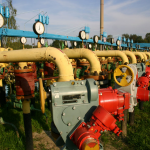RUSSIA MONITOR
Date: 29 July 2020
U.S. Lawmakers Seek New Nord Stream 2 Sanctions But Russia Does Not Stand Down
The United States has toughened its stance on the Nord Stream 2 energy link. The U.S. Congress added to its version of the National Defense Authorization Act, or NDAA, a provision extending the list of entities that may be involved in the project. U.S. Secretary of State Mike Pompeo warned investors that had put their money into the Russian natural gas pipeline project prior to Washington’s first punitive measures that they could also face sanctions. As the Kremlin says it will wait until the final version of sanctions is published, Germany is making efforts to lobby the U.S. Congress. Also, Denmark has granted permission for the last portion of the Russian Nord Stream 2 natural gas pipeline to be constructed, with its go-ahead to kick-start works in early September.

On July 20, the U.S. House of Representatives passed its version of the National Defense Authorization Act that also recommended stiffening punitive measures against any businesses that might help build the Nord Stream 2. The United States Senate on July 23 passed the $740 billion National Defense Authorization Act for Fiscal Year 2021. U.S. senators agreed to would expand existing bans to include penalties on any foreign parties providing underwriting services, insurance or reinsurance, and pipe-laying activities. With such sanctions, both Russia’s Nord Stream 2 and TurkStream are in deep trouble.
During their July 24 phone call, Vladimir Putin and Donald Trump did not discuss any sanctions against the Nord Stream 2 energy pipeline, Kremlin spokesman Dmitry Peskov told journalists. Moscow sees these measures as unacceptable, he added. According to the Kremlin official, Russia is now waiting for how the U.S. Congress will ultimately deliver its final stance on sanctions. Peskov added that both Russia and its partners had voiced concerns over sanctions against Nord Stream 2. “Our partners and us find them unacceptable. We believe these sanctions are a breach of international law,” Kremlin spokesman added.
Support Us
If content prepared by Warsaw Institute team is useful for you, please support our actions. Donations from private persons are necessary for the continuation of our mission.
Just a couple of days before, Die Linke party lawmaker and the chairman of the economic and energy committee of Germany’s Bundestag, Klaus Ernst, had addressed U.S. senators and representatives in a letter, urging them not to add extra sanctions to the bill setting policy for the Pentagon. Also, the U.S. Department of State said it would lift legal provisions that shielded companies that had invested in the project before restrictive measures were introduced. These are Gazprom’s five Europe-based firms that offered roughly half of the $11 billion worth of investment.
Despite this, Russia trumpeted a success the Danish Energy Agency (DEA) on July 6 authorized the use of Russian ships able to lay the final part of the Nord Stream 2 gas pipeline. The two pipe-lay vessels the Akademik Cherskiy and Fortuna –– and the Ostap Shereremeta and the Ivan Sidorenko, both smaller than the first two, can start laying pipes in Danish waters not earlier than in September. As cod spawns in those waters in July and August, work in that area is prohibited on environmental grounds. Some of the vessels are owned by Gazprom Fleet whilst others remain under the control of other Russian businesses. Russia deployed them as Western-based Allies stopped operations within the project when faced with massive U.S. sanctions.
All texts published by the Warsaw Institute Foundation may be disseminated on the condition that their origin is credited. Images may not be used without permission.


















